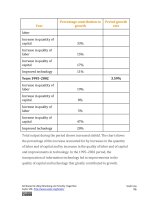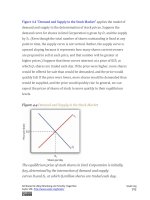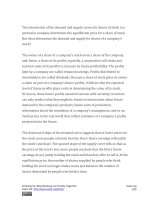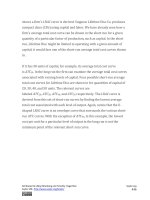Authors libby rittenberg 466
Bạn đang xem bản rút gọn của tài liệu. Xem và tải ngay bản đầy đủ của tài liệu tại đây (383.19 KB, 1 trang )
The assumptions of the model of perfect competition, taken together,
imply that individual buyers and sellers in a perfectly competitive market
accept the market price as given. No one buyer or seller has any influence
over that price. Individuals or firms who must take the market price as
given are called price takers. A consumer or firm that takes the market
price as given has no ability to influence that price. A price-taking firm or
consumer is like an individual who is buying or selling stocks. He or she
looks up the market price and buys or sells at that price. The price is
determined by demand and supply in the market—not by individual
buyers or sellers. In a perfectly competitive market, each firm and each
consumer is a price taker. A price-taking consumer assumes that he or she
can purchase any quantity at the market price—without affecting that
price. Similarly, a price-taking firm assumes it can sell whatever quantity it
wishes at the market price without affecting the price.
You are a price taker when you go into a store. You observe the prices
listed and make a choice to buy or not. Your choice will not affect that
price. Should you sell a textbook back to your campus bookstore at the end
of a course, you are a price-taking seller. You are confronted by a market
price and you decide whether to sell or not. Your decision will not affect
that price.
To see how the assumptions of the model of perfect competition imply
price-taking behavior, let us examine each of them in turn.
Identical Goods
In a perfectly competitive market for a good or service, one unit of the
good or service cannot be differentiated from any other on any basis. A
Attributed to Libby Rittenberg and Timothy Tregarthen
Saylor URL: />
Saylor.org
466









